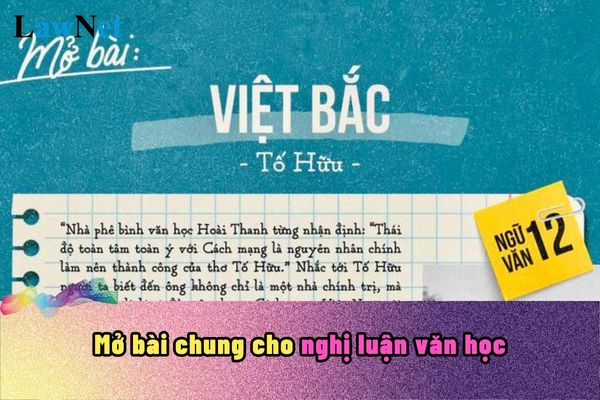What are the sample general introductions for literary argumentative essays? In Vietnam, what is the grade whose Literature curriculum includes literary argumentative content?
What are the sample general introductions for literary argumentative essays in Vietnam?
Students can refer to the following sample general introductions for literary argumentative essays in Vietnam:
|
General introductions for literary argumentative essays Sample 1 |
*Note: Information about sample general introductions for literary argumentative essays in Vietnam is for reference only./.

What are the sample general introductions for literary argumentative essays? In Vietnam, what is the grade whose Literature curriculum includes literary argumentative content? (Image from the Internet)
In Vietnam, what is the grade whose Literature curriculum includes literary argumentative content?
Under Section 5 of the general education program for Literature issued along with Circular 32/2018/TT-BGDDT as follows:
LITERARY KNOWLEDGE
1.1. The expressive nature of a literary text
1.2. Details and relationships between details in a literary text
1.3. The subject, theme of the text; emotions, and feelings of the writer
2.1. Elements: plot, characters, narrator’s words and characters’ dialogues in legends, fairy tales, fables
2.2. First-person and third-person narrators
2.3. Formal elements of six-syllable poetry: number of syllables, lines, rhyme, rhythm
2.4. Title, line, stanza, rhyme, rhythm, words and the effect of these elements in a poem
2.5. Narrative, descriptive elements in poetry
2.6. Forms of recording, narration, first-person narrator in memoirs or travel notes
TEXT CORPUS
1.1. Literary texts
- Legends, fairy tales, fables, short stories
- Poetry, six-eight syllable poetry
- Memoirs or travel notes
1.2. Argumentative texts
- Social argumentation
- Literary argumentation
1.3. Informational texts
- Text recounting an event
- Minutes recording
- Content summary diagram
2. Suggestions for text selection: see the suggestion list
Thus, according to the regulations, literary argumentative content is a necessary part of the 6th-grade Literature curriculum.
What are the perspectives on developing the 6th-grade Literature curriculum?
Under Section 2 of the general education program for Literature issued along with Circular 32/2018/TT-BGDDT:
- The Literature curriculum is developed on theoretical and practical foundations, updates on research achievements in education, psychology, and teaching methodology of Vietnamese literature; achievements in literature and linguistics research; achievements in Vietnamese literature across various periods; experiences in developing Vietnamese literature curricula, particularly from the early 21st century until now, and international trends in curriculum development in general, and the Literature curriculum in particular over recent years, especially from developed countries; societal practice, education, economic conditions, and Vietnamese cultural tradition, especially the diversity of students in terms of regions, conditions, and learning abilities.
- The Literature curriculum focuses on training communication skills (reading, writing, speaking, and listening) as a central theme throughout all three education levels to meet the program's capacity-oriented direction and ensure coherence and continuity across all grades and levels. Fundamental, foundational knowledge about the Vietnamese language and literature is formed through activities in comprehending and creating texts; directly serving the requirement of training in reading, writing, speaking, and listening skills.
- The Literature curriculum is developed with an open approach, reflected in not specifying detailed teaching content but stipulating the outcomes needed in reading, writing, speaking, and listening for each grade; delineating some basic, core knowledge about the Vietnamese language, literature, and some texts with a significant, crucial position in national literature as mandatory content for students nationwide.
- The Literature curriculum meets both the innovation requirements and emphasizes inheriting and enhancing the strengths of existing Vietnamese literature curricula, especially the current one.

